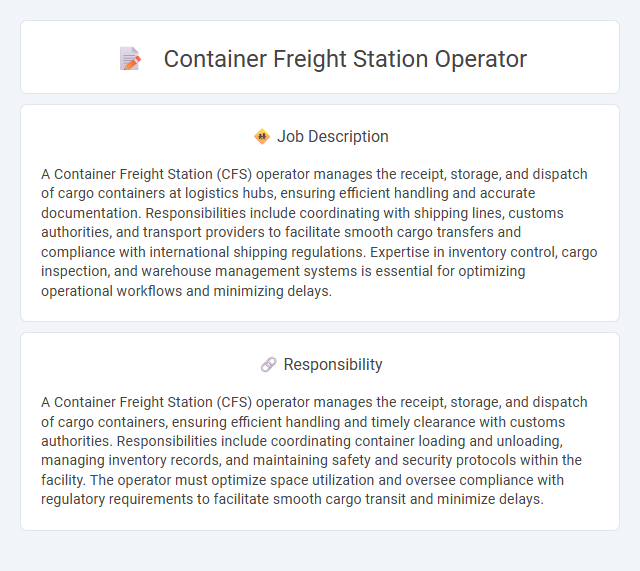
A Container Freight Station (CFS) operator manages the receipt, storage, and dispatch of cargo containers at logistics hubs, ensuring efficient handling and accurate documentation. Responsibilities include coordinating with shipping lines, customs authorities, and transport providers to facilitate smooth cargo transfers and compliance with international shipping regulations. Expertise in inventory control, cargo inspection, and warehouse management systems is essential for optimizing operational workflows and minimizing delays.
Individuals with strong organizational skills and physical stamina are likely to be suitable for a container freight station operator role, given the job's demands for managing cargo efficiently. Those comfortable working in a fast-paced, sometimes stressful environment might have a higher probability of thriving in this position. Prospects who prefer repetitive tasks or limited physical activity may find the job challenging or less compatible with their preferences.
Qualification
A Container Freight Station (CFS) operator must have strong knowledge of logistics, inventory management, and customs regulations to efficiently handle cargo consolidation and deconsolidation. Proficiency in operating cargo handling equipment, such as forklifts and cranes, alongside experience with warehouse management systems (WMS) is essential. Effective communication skills and the ability to coordinate with shipping lines, customs officials, and transport companies enhance operational accuracy and compliance.
Responsibility
A Container Freight Station (CFS) operator manages the receipt, storage, and dispatch of cargo containers, ensuring efficient handling and timely clearance with customs authorities. Responsibilities include coordinating container loading and unloading, managing inventory records, and maintaining safety and security protocols within the facility. The operator must optimize space utilization and oversee compliance with regulatory requirements to facilitate smooth cargo transit and minimize delays.
Benefit
Working as a container freight station operator likely offers significant benefits including competitive wages and opportunities for skill development in logistics and supply chain management. The role often provides hands-on experience with container handling and inventory control, which could enhance future career prospects in the transportation industry. Employees might also gain access to health benefits and supportive work environments, improving overall job satisfaction.
Challenge
Container freight station operator roles likely involve managing complex logistics and coordinating multiple shipments, which can present significant operational challenges. Handling unpredictable delays, ensuring accurate documentation, and maintaining compliance with customs regulations often require quick decision-making under pressure. These challenges may demand strong organizational skills and adaptability to maintain efficiency and minimize disruptions.
Career Advancement
A Container Freight Station (CFS) operator manages the receipt, storage, and dispatch of cargo containers, ensuring efficient handling and compliance with customs regulations. Career advancement opportunities include promotion to logistics supervisor, operations manager, or supply chain coordinator roles, leveraging expertise in container logistics and customs procedures. Proficiency in inventory management software and strong coordination skills accelerate growth within the global shipping and freight forwarding industry.
 kuljobs.com
kuljobs.com